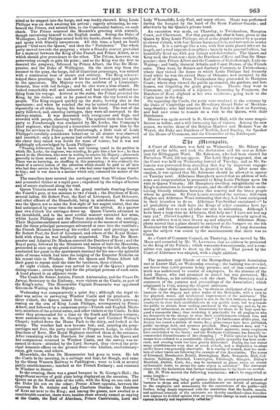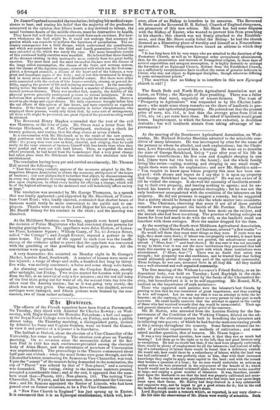Zbe _Metropolis.
A Court of Aldermen was held on Wednesday. Mr. Sidney ap- peared at the table, and took the declaration and his scat as Alder- man for Billingsgate Ward. Mr. Salomons, who had been elected for Portsoken Ward, did not appear. The Lord Mayor suggested, that as the Court was held on Wednesday instead of Tuesday, and as Mr. Sa- lemons was prevented from attending that day by important engage- ments, some indulgence should be granted to him. After some dis- cussion, it was agreed that Mr. Salomons should be allowed to appear on Tuesday next. Alderman Humphery moved that an address of wel- come and congratulation be presented to King Louis Philippe upon his visit to Queen Victoria; Mr. Humphery dwelling eulogistically on the King's declarations in favour of peace, and the effect of his rule in main- taining friendly relations between this country and the brave people whom he governs. Sir Peter Laurie seconded the motion ; Alderman Hughes and Alderman Wood intimating that they had been anticipated in their intention to do so. Alderman Farebrother exclaimed—" In all probability we shall have the Kings of other countries here by- and-by, and then we can all take our turn in addressing. Although I have been a long time an Alderman, God help me I I have not had my turn yet." (Great laughter.) The motion was unanimously agreed to, and an address was at once drawn up and adopted. Alderman Hum- phery moved that a place should be assigned at the banquet on the 9th November for the Commissioner of the City Police. A. long discussion upon the subject was ended by the announcement that there was no Court.
At a Court of Common Council, on Thursday, it was moved by Mr. Moon and seconded by Mr. W. Lawrence, that an address be presented to the King of the French ; which was carried unanimously, and a com- mittee was appointed to draw up the address. That passed by the Court of Aldermen was adopted, with a slight addition.
The members and friends of the Metropolitan Drapers Association met at Exeter Hall, on Wednesday evening : the building was crowded, not fewer than 5,000 persons being present ; and of that number one- tenth was understood to consist of employers. In the absence of the Lord Mayor, who had promised to attend but was prevented, Mr. Sheriff Sidney, as his substitute, took the chair. The Secretary read a statement of the purpose and proceedings of the Association ; which originated iu 1842, among the drapers' assistants.
" The object of the Association is, to obtain an abridgment of the hours of business in the drapery and other trades of the Metropolis, with a view to the physical, moral, and intellectual improvement of the assistants.' The plan adopted to accomplish this object is not, in the first instance, to appeal to employ ere to close their establishments at any specific hour, but to persuade the public to abstain from making purchases in the evening; and so, by re- moving all inducement, to make it unnecessary for shops to be kept open be- yond a reasonable time ; thus rendering it practicable for all employers who are favourable to the change to close their establishments without loss, and without fear from the competition of others." [In furtherance of this plan, the Society has issued a million of tracts, &c.; prize-essays have been published, public meetings held, and sermons preached. Many eminent men, and " a great majority of employers," have signified their approval; many employers have contributed to the funds ; and the Wesleyan Conference has formally re- commended discontinuance of late shopping.] " Public opinion has by these means been enlisted to a considerable extent, public sympathy has been awak- ened, and evening trade has been greatly diminished. During the last winter many establishments were shut at seven o'clock, and a disposition to adopt earlier hours was generally observable. It is worthy of remark, that the mem- bers of other trades are following the example of this Association. The towns of Liverpool, Manchester, Bristol, Birmingham, Bath, Newcastle, Hull, Col- chester, Salisbury, Hereford, Leamington, Edinburgh, Glasgow, Bishop's Stortford, Dublin, Cork, &c., may be instanced as places where an almost enthusiastic desire to secure the same object is exhibited." The statement closes with the declaration that further contributions to the funds are needed.
Mr. D. Wire moved the following resolution ; which he supported at some length-
" That this meeting, being of opinion that the present protracted hours of business in shops and other public establishments are devoid of advantage to the employers and unnecessary for the convenience of the public—and further, being deeply impressed with the conviction that the health, morals, and spiritual interests of the assistants are thereby sacrificed—does therefore now express its decided opinion that an immediate change in such a pernicious engem is loudly and imperatively callecifor." Dr. James Copeland seconded the resolution ; bringing his medical expe- rience to bear, and stating his belief that the majority of the profession concurred in the opinion that fifteen hours a day devoted to labour, the usual business-hours of the middle classes, must be destructive to health.
They knew full well that diseases must result from such exertions. For how- ever wholesome the food might be, it could not undergo that necessary di- gestion which was requisite to perform the functions of assimilation. The ne- cessary consequence was a fatal disease, which undermined the constitution, and which was perpetuated to the third and fourth generation—if indeed the race extended so far, which was rarely the case. The more immediate results of this continued bodily exertion were manifold. He believed that three-fourths of the diseases existing in this metropolis arose entirely from too great bodily exertion. The most fatal and the most irremedial diseases were the disease of the lungs called consumption, the disease of the brain and nervous system, and the disease of the digestive organs; connected with which was the liver com- plaint, a deranged stomach, a disease of the heart and of the kidneys, a very great and important organ of the body ; and at last this terminated in dropsy, and in many other diseases of a most dreadful nature. But there were other evils connected with the system of late hours—scrofula, strums, or general de- bility, sapping the powers of life and inducing nervous fever. In the manufac- turing towns the nature of the work induced a number of diseases, generally termed nervous diseases. There was another fact, namely, the debility of the physical powers generally predisposed persons to vicious indulgence. It was notorious that persons iu an exhausted state sought for stimulants. Hence a resort to gin-shops and cigar-divans. His daily experience brought before him the sad effects of this system of late hours, and more especially as regarded females. If the female part of the community in better circumstances, who employed those persons, would only think that, by some sort of arrangement, all these evils might be prevented, one great object of the present meeting would be obtained.
The Reverend Henry Hughes contended that the root of the evil was '_Mammon, or the love of gain. Mr. Owen read a letter from Mr. George Hitchcock, of St. Paul's Churchyard, enclosing a check for twenty guineas, and stating that his shop closes at seven o'clock. In a conversation with Mr. Hitchcock as to the result of the new system, that gentleman told him that the change in his establishment was hardly cre- dible: the young men were now so kina, cheerful, and obliging, that he could really do the same amount of business himself with less bands than when they were goaded and worn out with hard labour. Then, as regarded the moral effects produced, he had heard from the housekeeper that a very great change had taken place since Mr. Hitchcock had introduced this alteration into his establishment.
The resolution having been put and carried unanimously, Mr. Thomas Hall moved the following-
" That this meeting cordially approve of the measures adopted by the Me- tropolitan Drapers Association to obtain the necessary abridgment of the hours of business ; and now pledges itself to further that object, by discountenancing in every way the practice of evening shopping; and calls upon the public, and also upon employers, to afford every facility for effecting a change, which will be of the highest advantage to the assistants and will beneficially affect society at large."
The resolution was seconded by Mr. George Thompson, in a speech that was loudly applauded ; and supported by Mr. Shoolbred, of Totten- lam Court Road ; who, loudly cheered, contended that shorter hours of business would really be more convenient to the public and to em- ployers. Thanks were voted to the Lord Mayor for his support, and to Mr. Sheriff Sidney for his conduct in the chair ; and the meeting was dissolved.
At the Middlesex Sessions, on Tuesday, appeals were beard against the decision of Police Magistrates who had convicted divers persons for keeping gaming-houses. The appellants were John Harlow, of Leices- ter Place, Leicester Square ; William Cauty, of No. 60 Jermyn Street, called " the Cottage"; and Joseph Everett, reputed a partner in the same house. The ground of the appeal in each case was the insuffi- ciency of the evidence either to prove that the appellant was connected with the gambling or that gambling had actually gone on. All the convictions were quashed.
A very destructive fire occurred on Monday night in St. George's Market, London Road, Southwark. A number of houses were more or less injured ; a range of shops and stalls, a hundred feet long by thirty- five wide, was entirely consumed ; a horse and some sheep were burnt.
An alarming accident happened on the Croydon Railway, shortly after midnight, last Friday. Two trains started for London with people from the fair, at an interval of only a few minutes ; and the red tail•lamp of the first train going out for want of oil, the second train ran into the other near the Anerley station ; but as it was going very slowly, the shock was not very great. One engine, however, was disabled, several carriages were damaged, and fifteen persons were bruised by the con- cussion, two of them rather seriously.



























 Previous page
Previous page